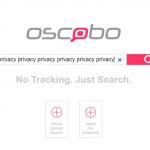Oscobo is a privacy-focused search engine that won't sell your data

Using the web can mean selling your soul to the devil. Or Google. (Which you may well regard as the same thing.) With the increased interest in privacy there is a new market for tools and services that help to protect users. Catering to web users who are concerned about how Google might use search data, Oscobo is a new search engine that promises not to track users.
Founded on the belief that "personal data should remain just that -- personal", Oscobo is a UK-based company that says it won't store any data about its users, let alone share it with anyone else. With the controversy surrounding the snooper's charter, it makes sense that the privacy-focused search engine should start life in the UK, but there are plans to expand further afield to provide tailored results for people around the world.
How to stop Microsoft nagging you to switch to Internet Explorer 11 or Microsoft Edge

All good things must come to an end. But the same can be said about bad things, and many people will be pleased to hear the death knell sound for Internet Explorer 8, 9, and 10. While Microsoft may be keen for people to use Edge or -- if they must -- Internet Explorer 11, not everyone feels the same.
With the likes of Firefox, Opera, and Chrome available, it might seem like madness that anyone would like to stick with an ancient version of Internet Explorer instead, but choice is everything. A patch that is due to be delivered to Internet Explorer 8, Internet Explorer 9, and Internet Explorer 10 in the coming day will introduce a nag screen that will pester users into upgrading. If you're happy with your decision to stick with an older version of IE, here's a hack to banish the pestering.
Microsoft poised to deliver a fatal blow to Internet Explorer 8, 9 and 10

In less than a week, Microsoft will only offer support for Internet Explorer 11 and Microsoft Edge. As of Tuesday 12 January, Internet Explorer 8, 9 and 10 will die. The aging browsers will receive one more update, and then will be consigned to the trash.
Tuesday is the day that older versions of IE reach the end of their support cycles, and Microsoft is keen for everyone to move to either Microsoft Edge or -- for the diehards -- Internet Explorer 11. If you have not already made the switch (or jumped to Chrome or Firefox), one more patch, KB3123303, will pester you into upgrading.
Would dropping the 140-character limit completely change the face of Twitter? [UPDATE] Jack Dorsey responds

Twitter could be on the verge of making one of the most significant changes in its history. The micro-blogging service has long been famed for its 140-character limit that allows for pithy quips, concise statements, and brief utterances. But all this could be about to change. Reports suggest that the 140-character restriction could be thrown out of the window, with a decidedly meatier 10,000-character upper limit being ushered in instead.
If such a change is implemented, it would bring regular tweets in line with direct messages which enjoyed a lengthening just a few months ago, and comes shortly after Twitter changed the order in which tweets are displayed. Both of these changes led to a good deal of debate, but would increasing the maximum length of a regular, public message by more than 70 times be such a fundamental change as to be a step in the wrong direction?
Why is Microsoft monitoring how long you use Windows 10?

The various privacy concerns surrounding Windows 10 have received a lot of coverage in the media, but it seems that there are ever more secrets coming to light. The Threshold 2 Update did nothing to curtail privacy invasion, and the latest Windows 10 installation figures show that Microsoft is also monitoring how long people are using the operating system.
This might seem like a slightly strange statistic for Microsoft to keep track of, but the company knows how long, collectively, Windows 10 has been running on computers around the world. To have reached this figure (11 billion hours in December, apparently) Microsoft must have been logging individuals' usage times. Intrigued, we contacted Microsoft to find out what on earth is going on.
Wi-Fi HaLow increases wireless range and reduces power consumption

As the Internet of Things starts to gather momentum, the Wi-Fi Alliance today announces Wi-Fi HaLow. The latest wireless standard is touted as being ideal for the IoT thanks to its lower power requirements and greater range when compared to current offerings.
Wi-Fi HaLow is an extension of the existing 802.11ah standard, and occupies the frequency bands below one gigahertz. The Wi-Fi Alliance says it is perfect for use in connected cars, smart homes and a number of different industries, but there will be some of a wait before the technology is available -- it's not due for certification until 2018.
Does this secret tapping tip speed up your iPhone or iPad?

Do you feel the need, the need for speed? If your phone's feeling a little sluggish, you might think it's time to hit the stores and invest in a new one, but if you're an Apple fan, you might want to hold off making a new purchase until you try this little trick.
A sneaky tip is doing the round that purports to speed up iPhone performance after nothing more than a few taps. It is real? Is it an early April Fool? Is it wishful thinking? That's for you to decide. Try out the tip for yourself and see what you think.
Lenovo ThinkPad X1 Tablet offers customization through clip-on modules

If you've ever searched high and low for a tablet but found yourself unable to track down the perfect device, Lenovo may have the answer. Taking a leaf out of Google's Project Ara design handbook, Lenovo today unveils the new customizable, modular ThinkPad X1 Tablet.
Powered by an Intel Core m7 processor and Windows 10, the tablet boasts up to 10 hours of battery life, but if this isn’t enough, there's a clip-on Productivity Module to ramp this up to 15 hours. This is the ThinkPad X1 Tablet's unique selling point -- a series of modules that can be used to personalize, customize and tailor the device to specific needs.
Ransom32 is JavaScript-powered ransomware affecting Windows, Mac and Linux

Cross-platform viruses and malware are something of a rarity, but now there's a first-in-its-class JavaScript-based ransomware that can infect Mac, Windows and Linux. Ransom32 uses the Node.js runtime environment running on the NW.js platform to burrow into the target operating system and hold files to ransom.
While on the face of it, this is just another example of ransomware that encrypts files and seeks Bitcoin payments to decrypt them, it is more than that. The NW.js framework not only allows for cross-platform infections, but also means it is harder to detect. Ransom32 bears some resemblance to CryptoLocker and has been dubbed Ransomware-as-a-Service.
New World Hackers take Trump offline -- but when does hacking vigilantism infringe on free speech?

My colleague Brian Fagioli has referred to the web being rather like the Wild West. I'm inclined to agree, but that's not to say that we have reached the same conclusion for the same reasons. For me, the web -- like the Wild West -- is not a world filled with danger, but one occupied by vigilantes. As a proponent of free speech, I find this concerning. One of the most highly-lauded of vigilantes is the disparate group marching under the ragged banner of Anonymous.
One of its taglines is 'We Are Anonymous', a phrase that can be uttered by anyone as there is no membership process -- if you say you are part of Anonymous, you are part of Anonymous. The group is not, for the most part, organized. Individuals and factions can fight for or against whatever cause they want, just like real-world vigilante groups. But Anonymous is not alone. There are hacking collectives and other online crusaders who see fit to take the law into their own hands. This might sound wonderful, but it's not necessarily a good thing. As New World Hackers demonstrate, attacks can target the wrong people and restrict free speech.
Chuwi Hi12 is a promising budget Surface-like tablet running Windows 10 and Android

Chuwi might not be a name that you're particularly familiar with (or have even heard of at all), but the Chinese company has some interesting hardware on the way in 2016. Can’t decide between a Windows 10 tablet, or one running Android? Chuwi Hi12 offers the ability to boot between Windows 10 and Android.
With more than a hint of iPad aesthetics, the Hi12 blends the worlds of Microsoft's and Google's operating system to create a budget version of the Surface with an Android bolt-on. As this is a tablet running both Android and Windows, it's no surprise that there's a Cherry Trail processor on hand to keep things ticking over.
American hacking group killed the BBC's online presence to test anti-ISIS attack powers

A huge DDoS attack took the BBC's websites offline on Thursday, as well as the broadcaster's iPlayer streaming service. The disruption lasted for several hours, and now a US-based group of 'cyber hackers' that usually targets ISIS has claimed responsibility.
The New World Hacking group is a self-proclaimed hacktivist group that supports Anonymous. It says that despite effectively knocking the BBC from the face of the web, it was only meant to be a test of server power rather than a targeted attack on the corporation.
Microsoft's promise of spying warnings is an empty gesture

Yesterday we reported that Microsoft will warn users of 'state-sponsored' attacks on their accounts. Sounds great, but does it actually mean anything? Is it a useful service by the tech giant, or just PR bluster?
Considering the covert nature of spying and digital attacks, coupled with legislation around the world, it seems likely that the announcement is little more than meaningless hot air. In the UK, for instance, the planned snooper's charter would make it illegal for companies to alert users to hacking and surveillance by British agencies.
Clueless UK government wants you to help define its digital strategy

The UK government has been heavily criticized for the way it is attempting to control the way in which people use the internet -- blocking porn, unfettered surveillance and so on. The snooper's carter in particular has been the subject of much disapproval, and in an apparent bid to avoid further complaints, the government is now crowdsourcing ideas for internet policies.
In an article entitled UK Digital Strategy - the next frontier in our digital revolution (a document replete with language and references akin to an elderly parent talking about some aspect of modern culture they don't quite understand), Digital Economy Minister Ed Vaizey explains that he is looking for "ideas from public and industry on the UK's digital strategy".
Now that Google Glass is enterprise-only, it is more appealing than ever

The first generation of Google Glass spectacularly failed to get off the ground despite a long beta period. The second generation is on the cards, and it has an enterprise focus which serves only to make the hardware even more appealing. There's no release date, or even a vague schedule for release, yet, but images of the next version of Google Glass have appeared online.
A new filing with the FCC shows just what we can expect from the next version of Google Glass, and it's extremely promising. While there's no suggestion of a consumer model being released, what we learn about the enterprise edition will serve only to make it more appealing to the masses -- great looks, a foldable design, and a larger display. Will Google bow to the pressure that's almost certain to mount and try again with a consumer version?
Sofia Elizabella's Bio
Sofia Wyciślik-Wilson is a queer, transgender journalist based in Poland. She has been writing about technology for more than two decades, and after years working for magazines, her writing moved online. She is fueled by literature, music, nature, and vegetables. You can find her on Bluesky and Mastodon. If you like what you read, you can Buy her a Coffee!
© 1998-2025 BetaNews, Inc. All Rights Reserved. Privacy Policy - Cookie Policy.
